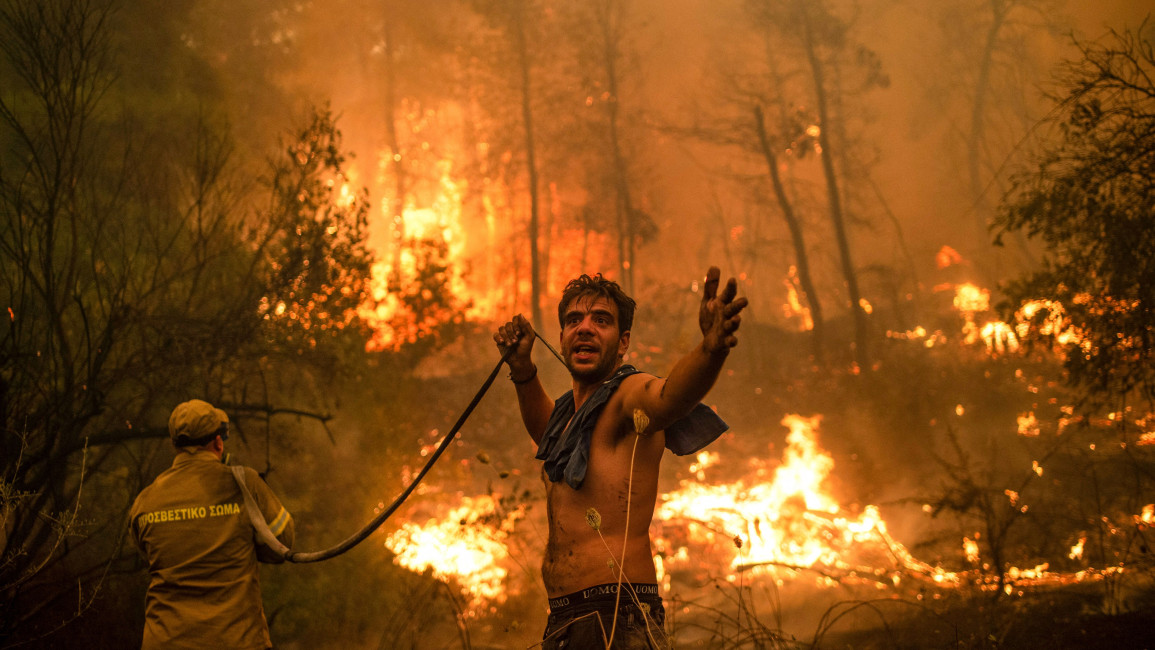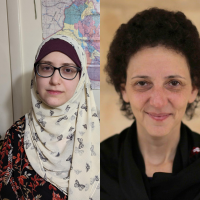
MENA's misguided climate change schadenfreude towards Europe
Schadenfreude is a German word that means taking pleasure in someone’s misfortune. It is morally uncomfortable, “a mark of the devil” according to 19th-Century German philosopher Arthur Schopenhauer. Granting the misfortune of others a sense of deservingness and tying it to the question of justice is one way to overcome the moral dilemma.
Such was the case for many Middle Eastern commentators on social media observing the climate crisis in Europe over the past two months. Schadenfreude - tashaffi in Arabic - became a political expression. It decontextualised Europe’s heatwaves and drought to mean well-deserved karma, a payback for Europe’s historical sins and current interventions in the region.
Because the unusual weather conditions came shortly after a global pandemic and coincided with the Ukraine war and a global economic meltdown, it opened a floodgate of misinformation tainted with apocalyptic thinking and metaphysical explanations - similar to the height of the Covid-19 global emergency.
During the pandemic, Egyptians reportedly ranked highest in Google searches for whether the coronavirus was a sign of the end of time. Scripture was used to confirm these speculations. This forced al-Azhar Mosque, Sunni Islam’s highest authority located in Cairo, to intervene to debunk the claims and ease people’s apprehension.
"In the Middle East - an area plagued with instability, uncertainty, and a constant state of lack of control - assigning catastrophes to a higher power relieves the believers from the burden of responsibility and eases their angst"
The weather upheaval across the European continent this summer was paralleled by unusual rainfall and flash floods in the Empty Quarter desert in Saudi Arabia and Oman, one of the driest locations on planet earth.
The paradoxical shift in rainfall prompted a storm of social media frenzy, and once again facilitated a broad range of metaphysical interpretations. The most popular is that the “unprecedented rain” was a realisation of Prophet Muhammad’s prophecy in which he predicted that “the land of Arabia will return to greenery and rivers, as it once was.”
Indeed, a green ancient Arabia is a confirmed scientific fact. The problem, however, lies in thinking of prophecies in a literal sense and of history as an unbroken causal chain, where a “correctly projected past” necessarily leads to the exact and literal future stipulated in the prophecy. Prophecies are also typically malleable and open to the Occam’s razor effect and cherry picking.
Metaphysical interpretations, nonetheless, are useful insofar as they provide believers with meaning, a sense of purpose, and mental comfort. In the Middle East - an area plagued with instability, uncertainty, and a constant state of lack of control - assigning catastrophes to a higher power relieves the believers from the burden of responsibility and eases their angst.
On another level, metaphysical interpretations can simply be a psychological deposition of people’s rejection of the present reality. It reflects their outlook toward a completely different future where the current “power relations" are reversed, or at least evened out. Any act of schadenfreude, in this case, is not inherently malicious, but a form of righteous gloating.
The “climate shift,” the schadenfreuders seem to think, is in a way “climate justice” as it may usher in an end to hundreds of years of Western exploitation and denigration of the region. Better yet, looking at how the Empty Quarter had temporarily turned into streams and lakes, it can only mean that with climate justice comes also compensation, greenery and water.
Such a worldview is understandable on the grounds of geopolitical and historical grievances, but remains in part an emotional assessment. And when feelings act as information, they simply create an “aspired reality” and veil the objective one.
The truth is that climate change is not a West-only problem and the assumption that Arabia is on the cusp of a new climatic cycle that will eventually turn it into lustrous meadows may be premature.
"Overall, the Middle East is one of the world’s hotspots for climate change. The region has been warming at twice the speed of the global average"
What we know so far is that there is an increase in extreme rainfall events in the northwest, east, and southwest regions of Saudi Arabia. Certain regions in the Arabian Peninsula receive their annual rainfall in only a few days, in the form of intense bursts of rain. However, the overall annual rainfall has decreased significantly over the period between 1994 and 2009, according to a 2020 study.
The same study suggests that between 1960 and 2010, temperature increased by 0.10C per decade. Rising temperatures and increased evaporation rates will likely lead to the depletion of scarce water resources critical to the region’s peoples. Unless the regional governments take meaningful measures to reduce greenhouse emissions, warns a 2015 paper in Nature Climate Change, parts of Arabia will likely be too hot for human habitation within 80 years.
Overall, the Middle East is one of the world’s hotspots for climate change. The region has been warming at twice the speed of the global average. Adding to the global decrease in the average rainfall, the Middle East already suffers from water scarcity. It is, in fact, the home of 12 of the world’s 17 most water-stressed countries. According to the World Bank, water scarcity will cost the region’s countries, most of which are already under huge economic strains, 6-14% of their GDP by 2050.
Not to mention that climate change will intensify the regional powers’ competition over resources and exacerbate conflicts, driving hundreds of people out of their homes and, ultimately, impacting global peace and stability.
The increasingly menacing weather conditions are systematic and not necessarily negated by the occasional intense rainfall in certain areas. Torrential rain may well be an anomaly and not a pattern repeated every year or season. What happened in the Empty Quarter was similar to what happened in Egypt three years ago, where years worth of rain fell within hours causing unprecedented flash flooding and extensive infrastructure damage. Since, Egypt’s precipitation levels remained at their annual average or below.
The hard data does not leave much room for wishful thinking or metaphysical interpretations. It most certainly takes away from the schadenfreuders any reasons for celebration.
When the UK is hit by record temperatures, the Rhine dries up, and drought kills crops and cattle across the European continent, this is not a Europe-only problem. And most certainly not a reason to settle political scores.
What happens in Europe does not remain in Europe.
Schadenfreude or not; it makes no difference.
Dr Emad Moussa is a researcher and writer who specialises in the politics and political psychology of Palestine/Israel.
Follow him on Twitter: @emadmoussa
Have questions or comments? Email us at: editorial-english@newarab.com
Opinions expressed in this article remain those of the author and do not necessarily represent those of The New Arab, its editorial board or staff.




